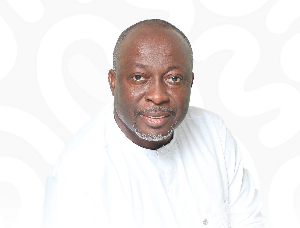Kufuor’s Coup Statement Having Telling Effect On Nation’s Risk Assessment… Ghana Not
Standard & Poor’s Report Considers Ghana’s Political Risks High
The secret behind the reason why President J. A. Kufuor’s numerous trips abroad, ostensibly to attract foreign direct investments into the country, have failed to yield commensurate dividends has been revealed. A Reuters report available to the Weekly Standard reveals that a Standard & Poor’s (S&P) ratings of investment destinations in sub-Saharan Africa does not deem Ghana as being among investment-grade rated countries in sub-Saharan Africa. The S&P report, according to Reuters, considers Ghana as being among countries where “political risks will continue to affect investment prospects.” “Only South Africa and Botswana are investment-grade rate,” Reuters reported. In plain English, it means that Standard & Poor’s, and, by extension, foreign investors, consider Ghana as being among countries with more than acceptable risk of political instability.
This finding in the S&P report, particularly affecting Ghana, does not surprise most political analysts especially as no less a person than the President of the Republic continues to flag the spectre of political instability in his quest to use fear as a weapon to achieve political goals.
Political analysts believe that President Kufuor’s statement that his predecessor has been soliciting funds from an oil-rich country to overthrow his government could have the most telling effect on the nation’s political-risk ratings.
Mr. Frank Agyemfra, a political analyst resident in the US, told the Weekly Standard, “I’m not surprised that Standard & Poor’s does not see Ghana as an investment-grade rated destination. If you have a country where even the Head of State, the man in-charge of the security, and for that matter the person responsible for stability of the nation, continues to say that his opponents are preparing to destabilise the country, which investor worth his sort would disregard such dangerous warnings and recklessly plunge his capital into such a shaky country?”
“President Kufuor might have achieved a short-term objective with that statement he made a few months ago, but the country would continue to pay the price for that statement for a long time to come, in terms of our national political-risk evaluation in the eyes of foreigners,” Mr. Agyemfra pointed out.
He however explains that it is not only President Kufuor’s alarming accusation of his predecessor that has contributed to Ghana being perceived by investment advisors like Standard & Poor’s seeing the country as not being an investment-grade rated destination.
“Ghana currently has ROPAL hanging as a Damocles’ sword over its head. At the moment, while it is not clear whether ROPAL would be implemented in the next election, what is clear is that the biggest opposition party, the NDC, has sworn to reject results of any elections that would be conducted under ROPAL. Clearly, this situation does not reflect a country that is stable,” Mr. Agyemfra observed.
“There is the need for greater consultation and collaboration among the political leadership of the country if we are to overcome these obstacles and attract the required volume of foreign direct investments so as to boost the technological and industrial sectors of our economy. At the moment, the investors that we attract are those who want to invest in the extractive industries, mining gold, diamond etc., where they make quick returns on their investments and scram out of the country before another election is due.
“If we need the more dependable long-term investments, then we must present the country as more stable than we have been doing so far,” Mr. Agyemfra advised. But beyond the spectre of political instability, there is also an apparent fear of lack of continuity in policies as well as fear of respect of agreements and contracts awarded by predecessor governments.
This fear was captured in the Reuters report that quoted a statement issued by one Veronique Paillat-Chayrigues, described as an S&P credit analyst, as saying “Politics are often personality-driven and succession is a key issue, with potential repercussions on policy continuity and reform agendas.” Here too, Mr. Agyemfra believes that the report captures, in essence, the political reality in sub-Saharan Africa, particularly Ghana.
“Investors consider continuity of policies as essential. Nobody would want to invest in an economy where with every change of government, policies are abandoned and agreements are routinely abrogated, as happened with the Ghana Telecom and the Malaysians as well as several such things. That single episode set back the clock of investment for the country several years. Now, investors would like to wait and see how successive governments treat agreements and contracts awarded by their predecessors in this country before they would start putting their money in our economy,” he stated.
The Standard & Poor’s ratings, though has a positive outlook on the future of African countries in general.
The report recognises that “fewer armed conflicts and multiparty elections organized throughout the continent testify to the advance of political stability in Sub-Saharan Africa.”
But it observed cautiously that, “nevertheless, the transition toward representative democracy is still ongoing, with serious credit concerns pending.” Political observers believe that another smooth transition of power in 2009, as happened in 2000 when the Rawlings-led NDC government smoothly handed over to the Kufuor-led NPP government, would go a long way to improve the country’s ratings.












